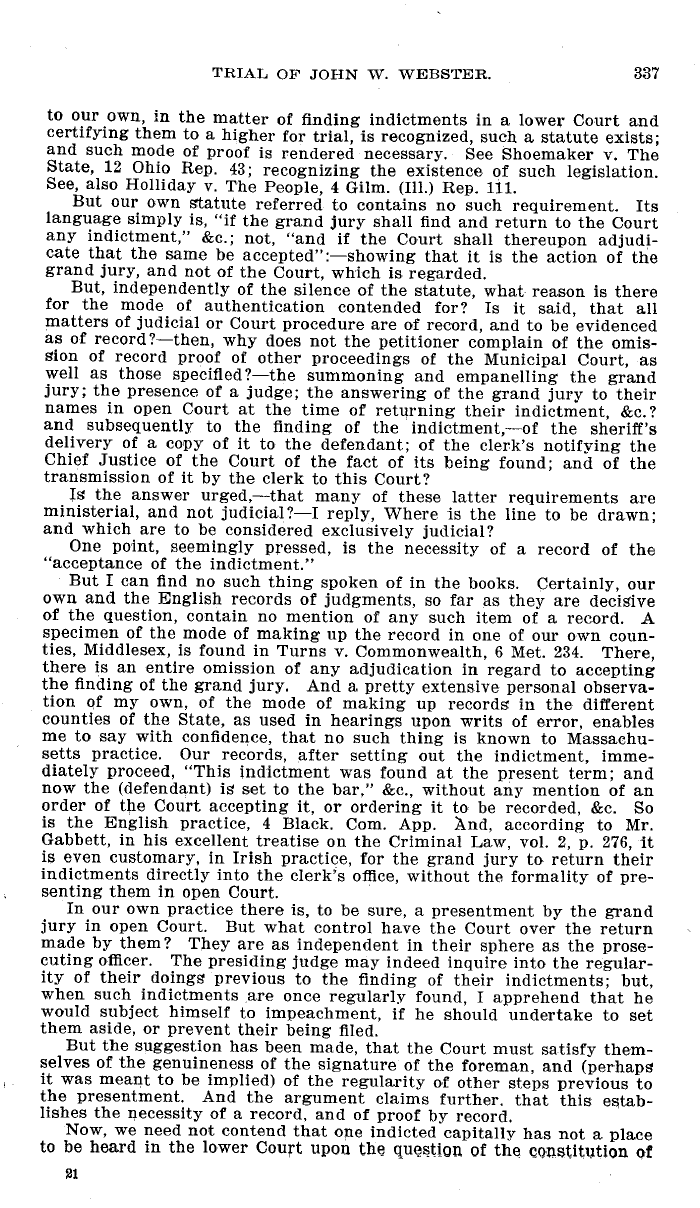|
TRIAL OF JOHN W. WEBSTER. 337
to our own in the matter of finding indictments in a lower Court and
certifying them to a higher for trial, is recognized, such a statute exists;
and such mode of proof is rendered necessary. See Shoemaker v. The
State, 12 Ohio Rep. 43; recognizing the existence of such legislation.
See also Holliday v. The People, 4 Gilm. (111.) Rep. 111.
But our own statute referred to contains no such requirement. Its
language simply is, "if the grand jury shall find and return to the Court
any indictment," &c.; not, "and if the Court shall thereupon adjudi-
cate that the same be accepted":-showing that it is the action of the
grand jury, and not of the Court, which is regarded.
But, independently of the silence of the statute, what reason is there
for the mode of authentication contended for? Is it said, that all
matters of judicial or Court procedure are of record, and to be evidenced
as of record?-then, why does not the petitioner complain of the omis-
sion of record proof of other proceedings of the Municipal Court, as
well as those specified?-the summoning and empanelling the grand
jury; the presence of a judge; the answering of the grand jury to their
names in open Court at the time of returning their indictment, &c.?
and subsequently to the finding of the indictment,-of the sheriff's
delivery of a copy of it to the defendant; of the clerk's notifying the
Chief Justice of the Court of the fact of its being found; and of the
transmission of it by the clerk to this Court?
IS the answer urged, that many of these latter requirements are
ministerial, and not judicial?-I reply, Where is the line to be drawn;
and which are to be considered exclusively judicial?
One point, seemingly pressed, is the necessity of a record of the
"acceptance of the indictment."
But I can find no such thing spoken of in the books. Certainly, our
own and the English records of judgments, so far as they are decisive
of the question, contain no mention of any such item of a record. A
specimen of the mode of making up the record in one of our own coun-
ties, Middlesex, is found in Turns v. Commonwealth, 6 Met. 234. There,
there is an entire omission of any adjudication in regard to accepting
the finding of the grand jury. And a pretty extensive personal observa-
tion of my own, of the mode of making up records in the different
counties of the State, as used in hearings upon writs of error, enables
me to say with confidence, that no such thing is known to Massachu-
setts practice. Our records, after setting out the indictment, imme-
diately proceed, "This indictment was found at the present term; and
now the (defendant) is set to the bar," &c., without any mention of an
order of the Court accepting it, or ordering it to be recorded, &c. So
is the English practice, 4 Black. Com. App. And, according to Mr.
Gabbett, in his excellent treatise on the Criminal Law, vol. 2, p. 276, it
is even customary, in Irish practice, for the grand jury to return their
indictments directly into the clerk's office, without the formality of pre-
senting them in open Court.
In our own practice there is, to be sure, a presentment by the grand
jury in open Court. But what control have the Court over the return
made by them? They are as independent in their sphere as the prose-
cuting officer. The presiding judge may indeed inquire into the regular-
ity of their doings previous to the finding of their indictments; but,
when such indictments are once regularly found, I apprehend that he
would subject himself to impeachment, if he should undertake to set
them aside, or prevent their being filed.
But the suggestion has been made, that the Court must satisfy them-
selves of the genuineness of the signature of the foreman, and (perhaps
it was meant to be implied) of the regularity of other steps previous to
the presentment. And the argument claims further. that this estab-
lishes the necessity of a record, and of proof by record.
Now, we need not contend that one indicted capitally has not a place
to be heard in the lower Court upon the quqstion of the constitution of
21
|

